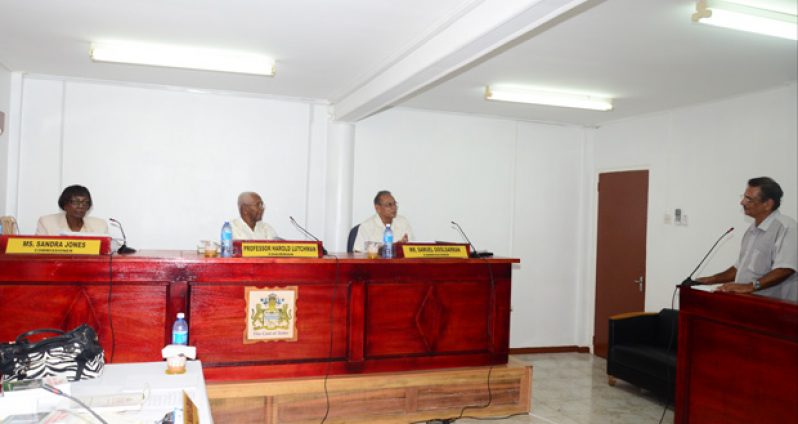By Michel Outridge
FORMER Auditor General Anand Goolsarran yesterday told the Commission of Inquiry (CoI) into the Public Service that the system of employing contracted workers needs to be revised based on estimates, since he is very concerned about the ‘elitist’ group reaping more benefits than traditional workers.He said he felt that there are two public services operating, one traditional and the other elitist, and the ‘elitist’ public service comprises contracted employees.
Goolsarran told the gathering that recruited elitist public service workers are ‘higher placed’ than the normal public service employees. He believes the traditional public service has been sidelined in preference to contracted employees.
Chairman of the CoI, Professor Harold Lutchman, questioned whether some ministries had more contracted workers than others; and in response, Goolsarran said yes, as he gave statistics in percentages.
Goolsarran explained that the elitist group of contracted employees occupies the most senior positions in the public service, leaving little or no room for mobility of the traditional public servants.
Goolsarran also read, and quoted extensively, from a book on the plight of the traditional public service, and said a de-politicised public service is required for the fair treatment of all employees.
He submitted that the solution is to reform the public service, so all could be treated equally and gain the same benefits. More training should also be done constantly, he said, even if there is a change of government.
Goolsarran noted that the way forward is to dispense with contract workers for a politically aligned, free public service in which employees must be free to do their duties, and he said promotions must not be based on years of service, but rather on qualifications.
He told the CoI that job specifications should be developed for vacancies, so both internal and external candidates can apply; and employment should be based on qualifications. Moreover, the appraisal system within the public service needs some adjusting, because some employees benefit from flaws in the system.
Goolsarran said there is no justification for the myriad contracted workers in the public service, since the traditional service has ably qualified people therein.
He explained that tampering with the public service started when some public servants became members of political parties, but things began to deteriorate rapidly from 1968.
Questioned on who represents the public’s interest, Goolsarran said those who serve the government of the day. He reasoned that even though its members operate within a series of rules and regulations, the public service is there to facilitate the smooth transition from one government to another.
Goolsarran said that in the event of a change of government, politically aligned public servants risk being removed. But, he said, other considerations should be put aside in favour of the public interest.
He also recommended that the constitution be modified in many areas, especially with regard to the appointment of permanent secretaries.
RETIREMENT
Goolsarran recommended that the retirement age — currently 55 — be increased to 60, because at that age some people are at their prime, and there should be leeway for voluntary retirement as well, he said, once those persons meet the pension requirements.
What he finds very wrong is that some people retire today and tomorrow they are contracted and are reaping double benefits. He said this should not be, because others in line would not have upward mobility.
DUTY-FREE CONCESSIONS
Goolsarran said duty-free concessions have spiralled out of control in both the private and public sectors, where they are being granted for purposes other than the execution of duties.
He also talked about the abuse of state vehicles, which can be seen parked at ministers’ or judicial staff members’ houses after 4:30 pm, although those vehicles have been assigned drivers. He said it is clear that those vehicles are being used for purposes that are extraneous to their official functions.
Goolsarran added that the 22,000 public servants in the public service need proper representation, since their grievances are numerous.
He deemed Christmas bonuses paid to members of the disciplined services as unwarranted because, he said, those bonuses constitute a month’s tax-free salary, whilst regular public servants get a meagre five per cent.
The former Permanent Secretary of the Ministry of Public Service, Mr Hydar Ally, made recommendations that were similar to Goolsarran’s. He aired his concern at the stagnation of wages and salaries for years.
The third speaker, Dave Hicks, who is attached to the National Drainage and Irrigation Authority (NDIA), Ministry of Agriculture, told the CoI he was speaking on behalf of 84 members of the public service when he said the culture in the public service needed openness and sharing of information.
He said many employees in his sector have not had a salary increase in years; and some persons have not been confirmed in their positions, despite their years of service and their having acted in those positions for years.
The CoI comprises Chairman Professor Harold Lutchman; Commissioners Sandra Jones and Samuel Goolsarran; and Secretary Geeta Chandan-Edmond. It meets at the Secretariat of the Public Service Ministry on Waterloo Street in Georgetown. Sessions are open to the general public for oral presentations.
The terms of reference of the CoI state that the commission is to enquire into, report on, and make recommendations on the role, functions, recruitment process, remuneration and conditions of service for public servants.
The CoI is also expected to determine measures to improve the efficiency of the public service, and to examine in detail how salaries and wages are determined and allocated.



.jpg)








